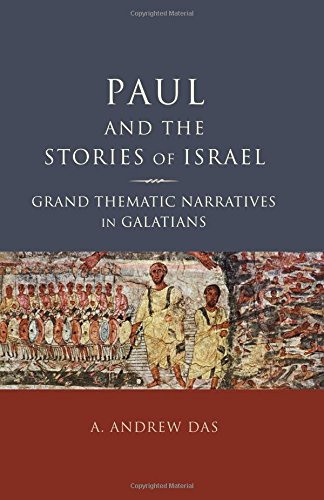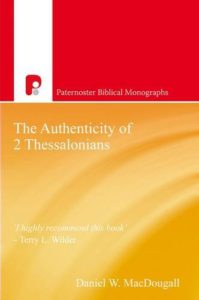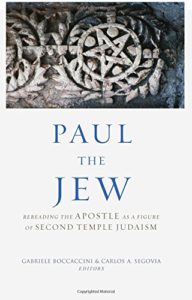 Paul the Jew. Especially since WD Davies’ Paul and Rabbinic Judaism, the quest for Paul’s Jewishness has continued. Of course Paul has other influences aside from Judaism, but his Jewish roots do often seem to be the most prominent. This new book, Paul the Jew: Rereading the Apostle as a Figure of Second Temple Judaism, has a series of essays connecting different parts of Paul’s thought with similar strands of thought in second temple Judaism. There are a couple heavy hitters such as Hurtado and Charlesworth, while all the essays look useful. Check out the table of contents on the Amazon page. Unfortunately I have no idea what Fortress is doing with that price, even on the Kindle version.
Paul the Jew. Especially since WD Davies’ Paul and Rabbinic Judaism, the quest for Paul’s Jewishness has continued. Of course Paul has other influences aside from Judaism, but his Jewish roots do often seem to be the most prominent. This new book, Paul the Jew: Rereading the Apostle as a Figure of Second Temple Judaism, has a series of essays connecting different parts of Paul’s thought with similar strands of thought in second temple Judaism. There are a couple heavy hitters such as Hurtado and Charlesworth, while all the essays look useful. Check out the table of contents on the Amazon page. Unfortunately I have no idea what Fortress is doing with that price, even on the Kindle version.
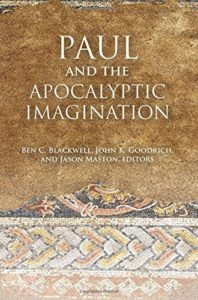 Paul and the Apocalyptic Imagination. Just as alive as investigations of Paul’s Jewishness are investigations of his apocalyptic thought. The discussion has centered especially around Galatians, with Campbell moving into Romans in his overly massive tome, and an entire apocalyptic Pauline school has sprung up. Paul and the Apocalyptic Imagination attempts to sort through the different portraits of Pauline apocalypticism and bring some clarity to the current debate. Enjoy essays from Wright, Campbell, de Boer, Humphrey, and more.
Paul and the Apocalyptic Imagination. Just as alive as investigations of Paul’s Jewishness are investigations of his apocalyptic thought. The discussion has centered especially around Galatians, with Campbell moving into Romans in his overly massive tome, and an entire apocalyptic Pauline school has sprung up. Paul and the Apocalyptic Imagination attempts to sort through the different portraits of Pauline apocalypticism and bring some clarity to the current debate. Enjoy essays from Wright, Campbell, de Boer, Humphrey, and more.
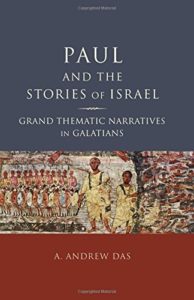 Paul and the Stories of Israel: Grand Thematic Narratives in Galatians. Andrew Das has produced a magisterial commentary on Galatians, about which I said, “If you chose only one commentary on Galatians, choose this one.” That work sets him up nicely to write about the proposed “grand thematic narratives in Galatians.” In Paul and the Stories of Israel, Das surveys six different proposed narratives that lie behind Paul’s thought in Galatians. These include the covenant (N. T. Wright); the influx of nations to Zion (Terence Donaldson); Isaac’s near sacrifice (Scott Hahn, Alan Segal); the Spirit as cloud in the wilderness (William Wilder); the Exodus (James Scott, Sylvia Keesmaat); and the imperial cult (Bruce Winter et al.). After critiquing these six views, he presents a seventh of his own that he believes has more merit and evidence, that the suffering servant lies behind Paul’s thought. Having seen good work on the various allusions to latter-Isaiah throughout Galatians, I might be interested to simply skip Das’s critiques and read his own proposal.
Paul and the Stories of Israel: Grand Thematic Narratives in Galatians. Andrew Das has produced a magisterial commentary on Galatians, about which I said, “If you chose only one commentary on Galatians, choose this one.” That work sets him up nicely to write about the proposed “grand thematic narratives in Galatians.” In Paul and the Stories of Israel, Das surveys six different proposed narratives that lie behind Paul’s thought in Galatians. These include the covenant (N. T. Wright); the influx of nations to Zion (Terence Donaldson); Isaac’s near sacrifice (Scott Hahn, Alan Segal); the Spirit as cloud in the wilderness (William Wilder); the Exodus (James Scott, Sylvia Keesmaat); and the imperial cult (Bruce Winter et al.). After critiquing these six views, he presents a seventh of his own that he believes has more merit and evidence, that the suffering servant lies behind Paul’s thought. Having seen good work on the various allusions to latter-Isaiah throughout Galatians, I might be interested to simply skip Das’s critiques and read his own proposal.
The Authenticity of 2 Thessalonians. Authorship debates continue on, and MacDougall in The Authenticity of 2 Thessalonians wants to defend, well, the authenticity of 2 Thessalonians. MacDougall begins with the testimony of Polycarp, that Paul wrote the letter. He then argues that several themes and ideas found in 2 Thess are also found in Paul’s other letters, such as tradition, eschatology, and imitation. Indeed, they are, but opponents will point out either that the theme in 2 Thess is different than in the accepted Paulines, which suggests a slightly innovative pseudepigrapher, or that the theme is exactly the same, which suggests the pseudepigrapher is slavishly imitating Paul. Well, check out MacDougall’s work to see how he handles these issues.

